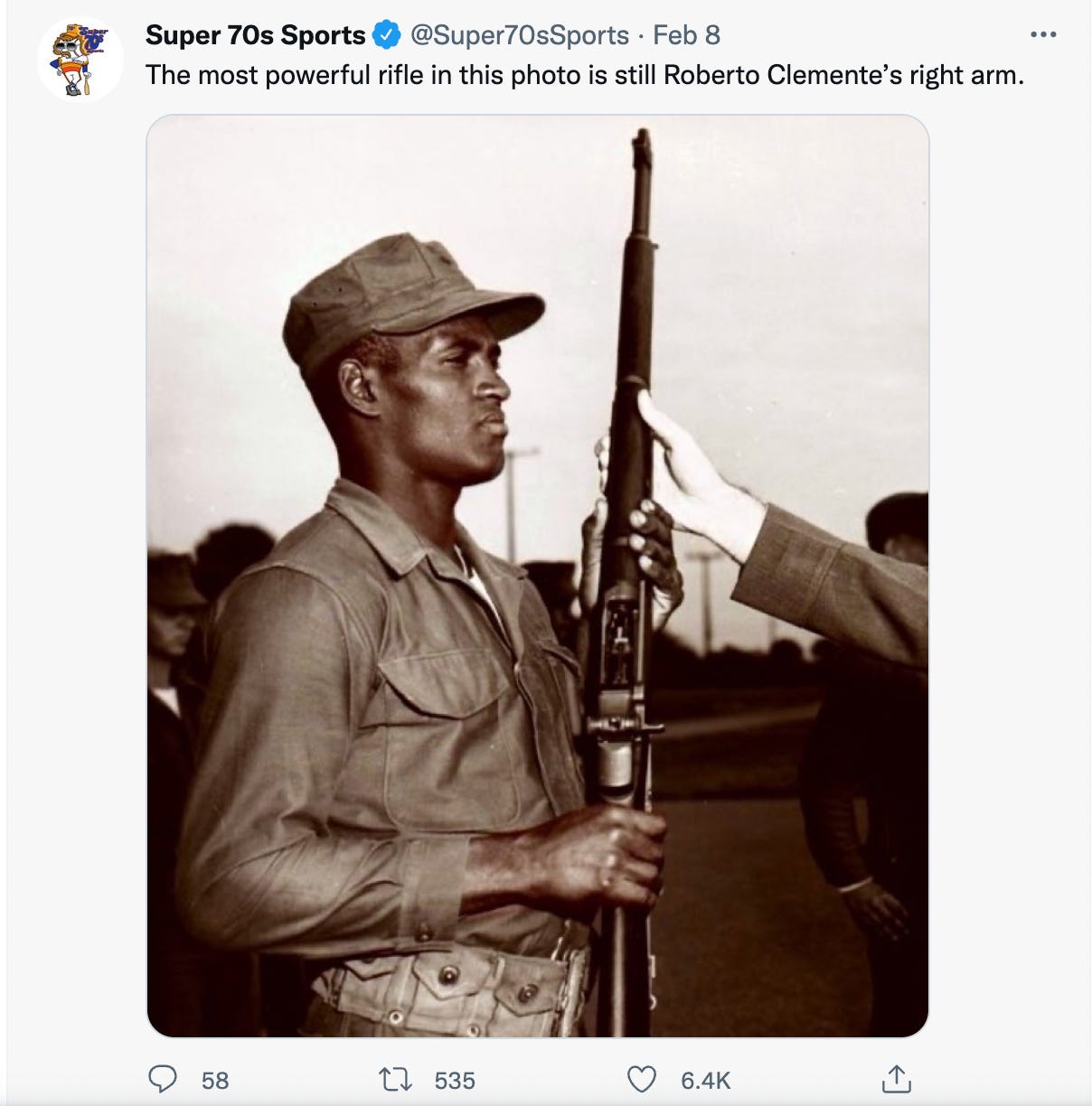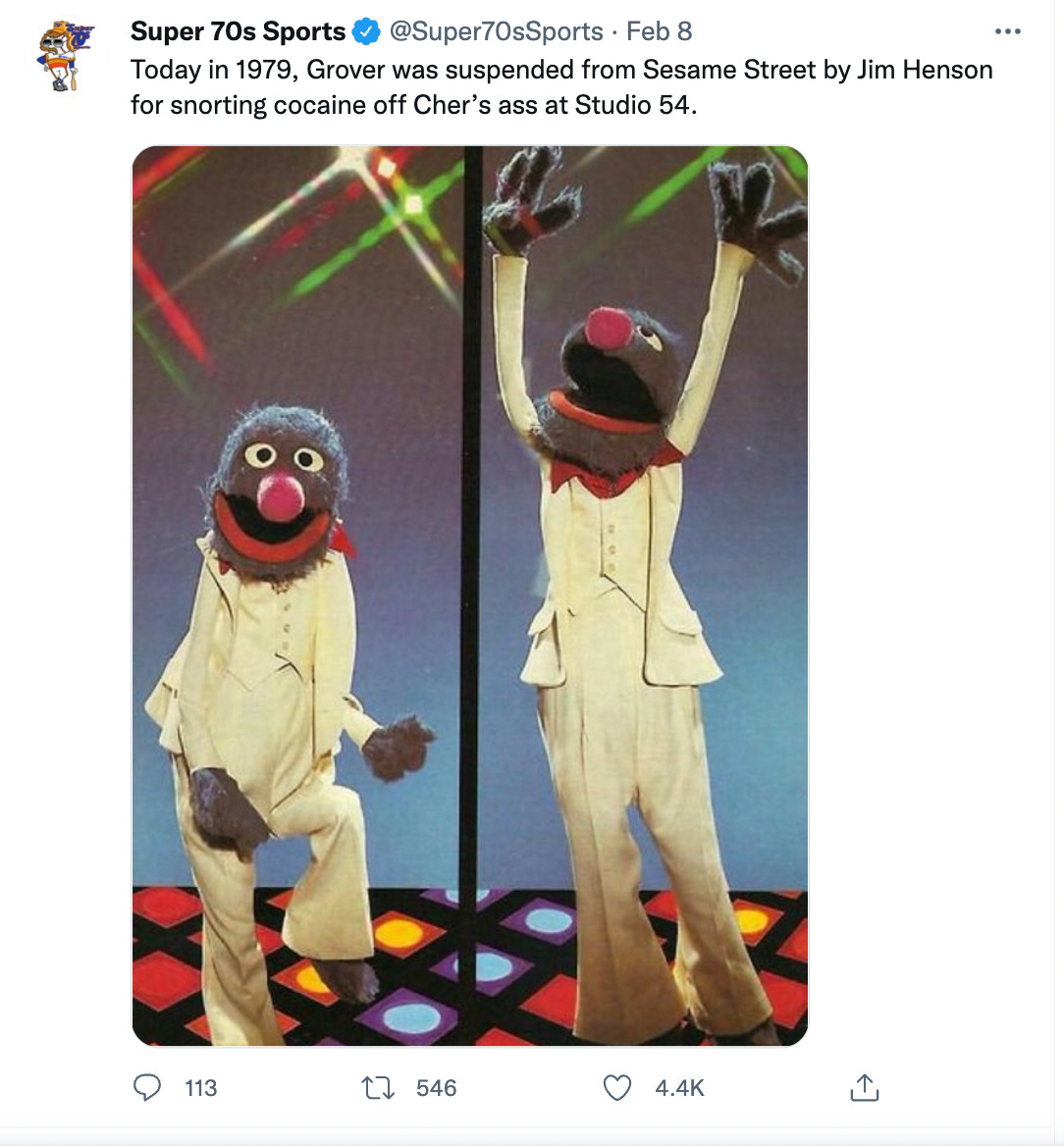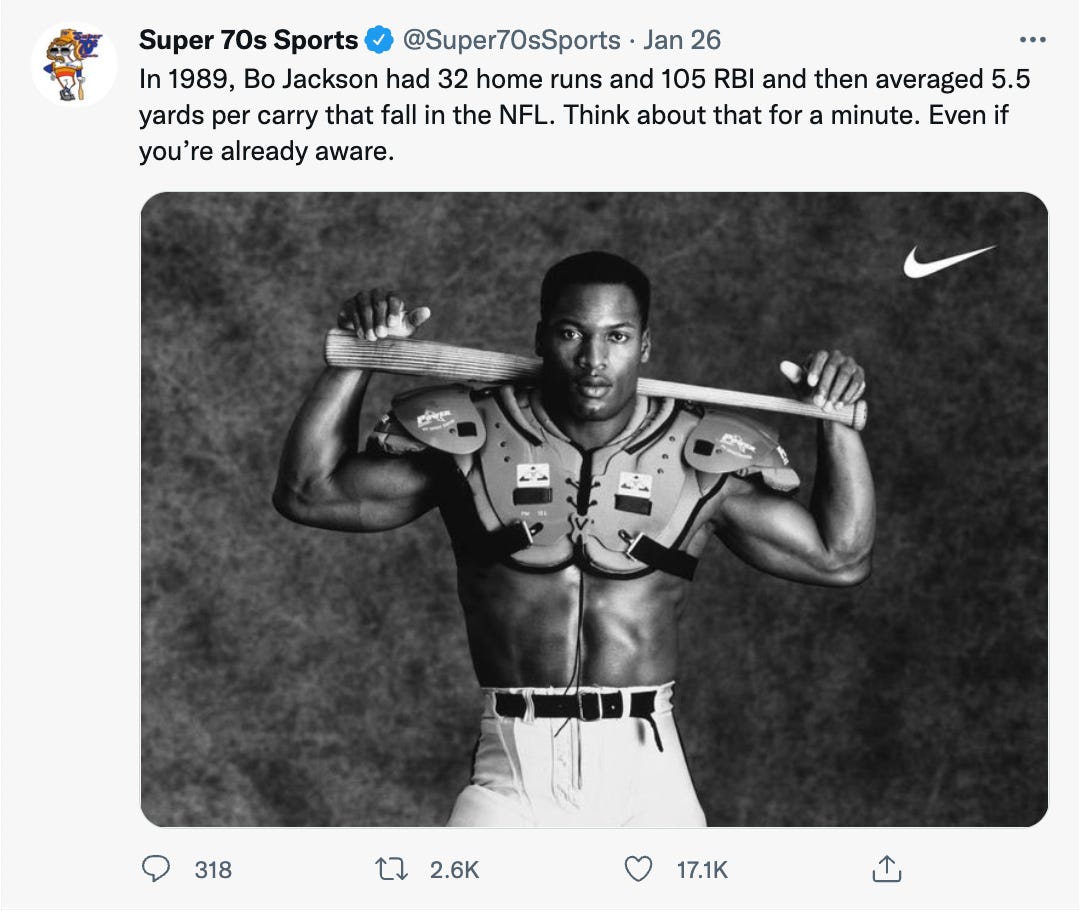Look at This Sweet Bastard
The Philosophy of Super 70s Sports
For years, Ricky Cobb has delighted his Super 70s Sports Twitter audience (currently more than 525,000) with old photos, sarcastic sentences and impish whimsy. It seems like all my male friends aged 30 to 50 know of Super 70s Sports. Most of them take no trivial amount of their days to soak in Cobb’s comedy relief. Heck, I deleted my Twitter accounts years ago, but almost every day I look up Super 70s Sports and catch up on the day. For the uninitiated, here are a few representative posts:
Beneath the sarcasm and more than occasional foul language sits a distinct approach to life. My political philosophy professor at Georgetown, Fr. James V. Schall, SJ, argued that most people come closest to engaging in philosophy when they watch sports. So perhaps I should not feel surprised to find a coherent approach to life and a wondering about the world in Super 70s Sports. Here are five elements of the philosophy of life according to Super 70s Sports.
Know Thyself
Ancient philosophy, especially the Oracle at Delphi, urged one maxim above all others: “Know Thyself”. Indeed, in a sense all of philosophy aims at this admonition – for us to know ourselves as individuals, and for humanity to better know its collective self. And Cobb, as evidenced by Super 70s Sports, knows himself.
Sarcasm? Expect it. His preferred decade? The 70s. Defiling honored children’s role models? Oh yes. The “fucking” and “goddamn”? You’ll read them at least once per day. The joy Cobb undeniably derives from his Twitter account? Absolute and total. You sense that Cobb would publish the same tweets even if he had zero followers.
He returns to themes again and again – the Tampa Bay Buccaneers’s orangecicle uniforms, badass NFL defenses, kids’s freedoms of the 70s, and wiffle ball. He loves certain athletes – Joe Namath, Dale Murphy, Andre Dawson, Ozzie Smith, Mike Tyson, Tony Gwynn, Larry Bird, Muhammad Ali. They anchor his work In a 2019 interview, Cobb stated, “The one thing I learned from doing this is I am just being me….I try to be true to myself. When people have this to say about the cursing or whatever … if you knew me and you hung out with me and you were my friend, that’s how I talk. So that’s how I’m going to tweet. It’s real easy. I don’t have to remember who I’m trying to be that day. I’m just myself, and it makes it simple.” Cobb knows himself, knows his passion, and he reveals it every day through Super 70s Sports.
Know Thy Place
My fellow Kentuckian, Wendell Berry, writes about the importance of place. He urges us to have a place in the world, to live and to love a specific place in the world, and to know it more intimately than we believe we can know anything.
For Super 70s Sports, that place is actually a time period. The 1970s America, mostly, with a smattering of the 60s, 80s and 90s. In Cobb’s rendering, that place becomes as memorable to us as any house, city or country. In Kojak, the Six Million Dollar Man, the ABA, William Shatner, Gordie Howe, and so many others, we feel like we live in the 1970s. That weird decade brought us macho but not self-serious tough guys, Roger Moore as James Bond, America out of Vietnam and chilling, the Cold War gets colder but somehow doesn’t seem as threatening, and sports dynasties like the Big Red Machine. They all live in the Super 70s Sports neighborhood. And they all become your good friends.
Have a Point of View
Cobb cares passionately about the sports figures of the 1970s. You revel in his near idolatry of his boyhood sports heroes. And he is a smart and savvy fan. He champions sports figures who he views as passed over or wrongfully ignored. He constantly pushes for these overlooked players to receive their due, often urging their election to the Hall of Fame.
Again and again, he rails against the injustice of leaving out Tommy John, Dick Allen, Lou Whitaker, Minnie Minoso (who finally will be inducted in the class of 2022), and many others. Many people – including many of these sports’s Hall of Fame voters – disagree with Cobb. But Cobb has examined his world, and he brings his own point of view to the fore. We all should.
Toughen Up
He continually points out where and why sports in the 1970s surpassed those of today. He unrelentingly criticizes the current NFL pass interference rules and baseball pitchers’s low pitch counts, among others.
Cobb doesn’t seem like a sourpuss old fogie whining the constant refrain “Back in my day.” (Is there anything more pathetic – and less inspiring and gentlemanly – in sports than the members of the undefeated 1972 Miami Dolphins making a champagne toast when the last undefeated team loses each year?) No, Cobb appears to have a point in his drive to toughen up. In my reading, he suggests we exhibited more virtue when we acted tougher. In sports, that manifested itself in taking the football hit, pitching complete games, and so on. Those virtues in sports echoed in other areas of life – Ted Williams taking time off from baseball, twice, to fly air raids in World War II and the Korean War, for instance. Yes, in modern days we have the example of Pat Tillman. But his actions and sacrifice seem extraordinary today because they are so unusual, even so perplexing, to us. Williams’ Air Force tour seemed usual for his day – simply what one did in the situation.
Show Some Goddamn Personality
Finally, what makes Super 70s Sports a must-read for me each day? Its personality. Its unique perspective on the world. It takes a certain kind of genius to write this:
Cobb shows his flair in other ways. He often tells a mind-blowing stat about an athlete, then urges readers to “Think about that for a minute.” In that infusion of a pause, Cobb commands us to stop scrolling. And then actually mull over that athlete’s accomplishment. Statistics can deceive us. We read them and think, “Yeah, yeah, cool, cool.” But to ponder Bo Jackson putting up near Hall of Fame numbers in his precious few seasons in baseball – his second sport – truly boggles our intuition about what the human body can accomplish.
Cobb shows off his personality, and he admires it in others. He tweets frequently about Joe Namath wearing his fur coat – on the sidelines of an NFL game! He has posted about this magical Andre Dawson moment more than once:
Cobb will not let the 70s go quiet into that good night, and he loves people who won’t go quiet either.
In Conclusion
I’ve never spoken with Cobb, so maybe all this analysis is phooey. But we reveal ourselves in our writings. By my reading, Cobb has way more philosopher in him than most readers might assume.
In an age in which many (most?) of us wonder, even struggle, to determine who we are and what we stand for, I find it refreshing to read someone daily who has clear answers. And who uses his joy of sports to push us gently to wonder more about our place in the world and how we should live in it.


















